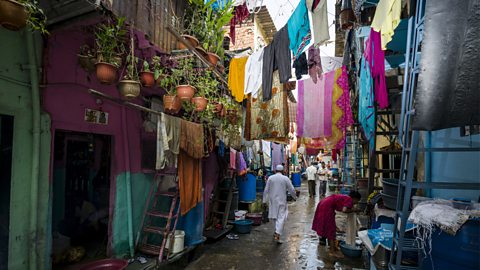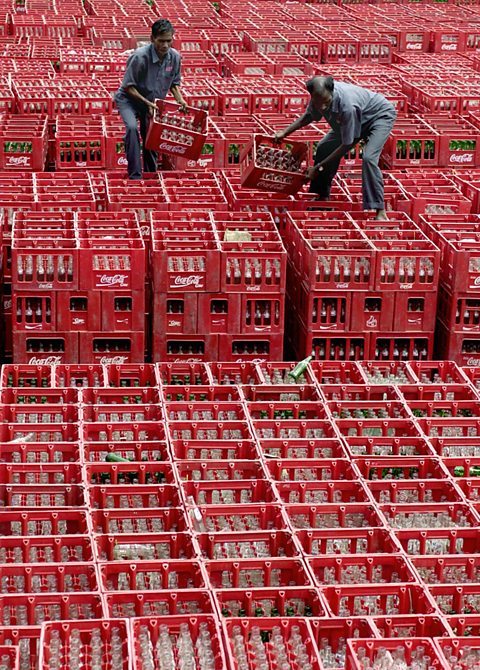Development in Mumbai, India
India is an example of a newly industrialised country (NIC)This is a country that is becoming wealthier, usually because it has started to make products or offer services to other countries.. Each year thousands of people move to the city of Mumbai from rural areaAn area of countryside.. Mumbai is an important trading city within India and its trading bloc. Many large multi-national companies are located here, such as Coca-Cola and Tata Steel. These provide employment and generate income across the region.
People move to Mumbai because the city has lots of pull factorA factor which attracts people to move to a new place.. People think that the city will provide lots of opportunities such as:
- social - better housing and services, eg healthcare and education
- economic - more jobs and higher wages
- environmental - better living conditions with a safer environment (less chance of natural disasters)
People who move think that they will have a better quality of life. However, cities such as Mumbai face lots of challenges, and the people who move there do not always have a better quality of life. Some of the challenges they may face include:
- social - poor housing conditions and crime
- economic - low wages or unemployment
- environmental - polluted drinking water and a lack of sanitationThe treatment and proper disposal of sewage.
A problem of rapid rural to urban migrationThe movement of people from the countryside to the city. is the development of squatter settlementAn area of makeshift housing, often unplanned and built illegally.. In Mumbai the squatter settlement of Dharavi is now home to over 1 million people. Dharavi lies between two railway lines and is one of the biggest squatter settlements in the world. The squatter settlement is unplanned and has these characteristics:
- overcrowded and noisy
- houses are made from cardboard, wood, corrugated iron, plastic sheeting and metal from oil drums
- lack of sanitation and clean drinking water
- open sewers
- pollution and disease are common
- thousands of workshops and people employed in the informal job sectorCash-in-hand jobs where people do not pay taxes to the government.

Improving squatter settlements
Brazil is also an example of a newly industrialised country (NIC)This is a country that is becoming wealthier, usually because it has started to make products or offer services to other countries.. In Brazil, squatter settlements have been improved through self-help schemeA type of informal programme that enables people to help themselves and their neighbours to improve their homes in developing countries.. This is when residents improve their own home with the support of the local authority. For example, the local authority may provide cheap building materials or a loan for residents to purchase them. Residents make all the improvements to their homes themselves.
The impacts of Multi-National Companies (MNCs) in Mumbai
Mumbai is a vital trading hub within India and the Asian economy. Many large companies are now locating in Mumbai, often to take advantage of lower wages, reduced government interference and cheaper rental costs. While the economic benefits of these companies locating in India means wages and job opportunities are increasing in their country, there are also several significant threats of large MNCs setting up in NICs.
The impacts of Coca-Cola in India

Coca-Cola is one of the most recognised MNCs in the world. Found in over 200 countries it is estimated that 95 per cent of the world recognise its famous logo.
Advantages of Coca-Cola in Mumbai
- Coca-Cola has invested over $2 billion in India since 2011, employing an estimated 25,000 people direct employment Direct employment means that people work for the company and are paid by the company and over 1 million people indirect employment When people benefit from a business but are not directly employed by it, eg a transport company may benefit from delivering a product but are not owned by the producer..
- This leads to increased tax contributions to the Indian Government by the workers, and this creates the positive multiplier effect (PME)PME refers to the positive knock-on-effect after something has occurred. Geographers often use this term when analysing the positive impact created by a business setting up in a location. .
- Workers are provided with opportunities to develop skills, and many apprenticeship training courses are provided to local people.
- The Coca-Cola Foundation provides financial support to local issues such as drug awareness programmes, disaster relief programmes and recycling.
Disadvantages of Coca-Cola in Mumbai
- One of the most reported threats associated with Coca-Cola is that the company is depleteTo take away and reduce the amount of something. groundwater supplies across the region. Local farmers have reported having to dig down nearly 250 feet for water which once stood at only 50 feet. Water is an essential element in Coca-Cola.
- Land is also said to be âpoisonedâ as waste sludge from the manufacture of Coca-Cola also ends up in water supplies and agricultural lands.
- Many workers are also overworked and underpaid in conditions which would not always pass health and safety regulations in western countries such as the UK.
- Drinking Coca-Cola also increases health related issues since the drink contains large amounts of sugar and caffeine, which puts an added strain on the health services.